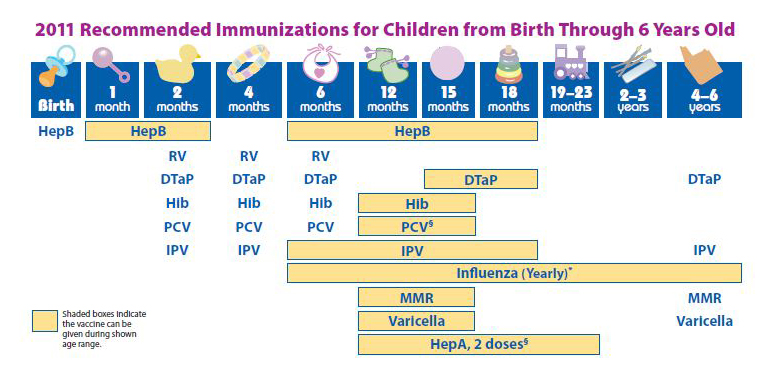March 24, 2011
Childhood Vaccinations Safe and Healthy
By: Joanne I Leigh-Murfin, RN, LCCE | 0 Comments
[Editor's Note: Recently, Science & Sensibility reader and childbirth educator, Lucy Juedes, wrote in hoping to see a blog post on the topic of childhood vaccinations. After very little arm twisting, Lucy was coerced excited to compile the following post, complete with guidance as to how she approaches this topic, while teaching classes.]
Introduction
My community, perhaps like yours, seems to have a growing number of parents who don't vaccinate their kids. These diseases, such as highly contagious pertussis (whooping cough) and measles, are showing up in more and more outbreaks, affecting more and more of our families. As Lamaze Certified Childbirth Educators, we are in an excellent position to share the strong evidence supporting childhood immunization, while listening to and addressing parents' concerns in an open, caring setting.
Evidence-Based Vaccine Information
From a parental perspective, the primary issue to address regarding vaccines is safety. And, from an evidence perspective, the overwhelming majority of immunology and public health experts have found the currently recommended vaccines to be safe for the overwhelming majority of children. Vaccines are tested on more people for longer durations than any other drugs. Innovations have decreased the number and scope of side-effects. And there is a full-circle program to promptly notify governmental health experts of any rare adverse events. (Offit) It would be nice if there was this much expert consensus about the use of common interventions in childbirth, such as continuous electronic fetal monitoring or denying food to a laboring woman! And, whether we look at the Centers for Disease Control and Prevention, the World Health Organization, medical organizations such as the American Academy of Pediatricians or The American Academy of Family Physicians, leading medical facilities such as the Mayo Clinic, or established organizations like The March of Dimes, they all have the same message: vaccination against preventable childhood diseases is safer and healthier than not vaccinating. We only need to examine history to see the alternative to not vaccinating: natural selection. (Diamond)
Vaccination Talk
A little context first. By the time I share the vaccine information, the moms and partners are pretty steeped in three key ideas: evidence-based decision making, the parents as the best decision-makers for their families, and that mirroring each others' decisions isn't necessary. Most of the moms and partners talk a lot in class (Any question, any time!), so I've had ample opportunities to share how they can use these ideas in the wide range of decisions they'll make about their own and their child's care. These key ideas help parents to hear the very strong evidence-based nature of vaccinations as well as that they are the best people to decide what to do, and that they can decide differently than their friends and remain good friends. So, what do I do in my class? I share that vaccinations do a great job of preventing childhood diseases the best we've come up with so far. Vaccinations are safe for just about everyone and will keep their baby healthier than not vaccinating. I suggest that their doctor or nurse will ask specific questions to prevent an allergic reaction, such as if the child is allergic to eggs (some vaccine viruses are grown in chicken eggs). And I share the above information about the evidence-based foundation supporting vaccinating according to the suggested CDC/AAP/AAFP schedule.
This discussion takes about five minutes, and I hand out the list of childhood diseases and vaccines that prevent them and the suggested time line, downloaded from the CDC's web site. I also offer the web sites of the above listed organizations should folks want more information.

Specific Questions from Participants
Inviting participants to share details of what they've heard or read is a great way to encourage class dialog about this topic. My goal here is to discover concerns, as well as common myths or misgivings about vaccination, and to address these simply and quickly. Here are the three most often asked questions and my responses.
"I've heard that vaccines have mercury in them and that they cause autism."
"Vaccines contain very little mercury, and they don't cause autism. About autism, there's absolutely no evidence of a link between vaccines and autism. It's understandable that a parent might think there is because autistic characteristics are often noticed around 18 months, and by that time, at least one part of all the suggested vaccines have been given. But specialists in the academic and public health areas have studied this up and down and have found no link. And not just doctors, but specialists in immunology and child health. (Offit) Actually, the closest researchers have come to finding a cause for autism are recently discovered rare, very unique genetic variations in children with autism. (Shute)" You also mentioned mercury. The active ingredients in vaccines need to be preserved in order to stay effective. Some vaccines, like the Measles, Mumps, and Rubella vaccine that was used before 2001, use thimerosal as this preservative, and thimerosal has mercury in it. However, since 2001 thimerosal has been taken out of all vaccines recommended for young infants. But autism has increased, not decreased." (Offit)
"We're thinking about doing an alternative schedule -- it seems like there are so many vaccines given to a baby. Too many for their little bodies to handle."
"Actually your baby is exposed to many, many more microbes, bacteria, and viruses every day ...many more than are in vaccines. And a single infection of the common cold causes a much stronger reaction in a baby than if we were to give all the suggested vaccines at one time to him or her. The science behind vaccines has been refined a lot in the century + that we've been making them. Now, there are very few ingredients in them...even with the grouping of vaccines into one shot like in the MMR and DTaP. And nothing else will help their little bodies develop strong defenses against these diseases than the associated vaccines. The sooner babies are immunized, the sooner they'll become more protected." (Offit)
"I'm worried about our baby being allergic to something in the vaccine, and if we give several vaccines to our baby at the same time, how will we know which one caused it?"
"On its web site, the CDC has a thorough list, likelihood, and timing of all vaccine allergic reactions or side effects. As you look at each new round of suggested immunizations, it could be that the vaccines' possible side effects don't overlap, so it would be clear which vaccine caused a reaction. Or, if side effects were similar, most reactions usually show up a few hours to a few days later, so you could space the shots a few days apart. And the side effects are generally nothing that a little TLC and maybe a fever or pain reducer won't take care of. And I want to stress that even the mild side effects are uncommon and the difficult side effects are rare, or why would our health experts recommend the vaccines? Be ready to comfort your baby after the shots while still in the Dr.'s office, especially with breastfeeding. And I don't tell my baby not to cry; that's how they communicate with us.Often babies are fine a few minutes after."
Our overall vaccination discussion generally takes about 10 minutes. By the end of it, the moms and partners know the strength of the evidence supporting vaccinating. They also have more information to use in discussions with each other, family members and friends, and to supplement their search for information.
Other Class Discussions Related to Vaccination
Vaccination discussions don't only come during the specific talk at the end of class. At the beginning of class when we talk about staying healthy while pregnant, I talk about the protection that the current seasonal and H1N1 flu vaccination gives pregnant women.When we talk about choosing the baby's doctor, we talk about finding a caregiver with a similar approach to health as they have. I also note that as many as 4 in 10 practitioners won't see non-vaccinating families. (Offit) Also, if a parent decides not to follow the suggested schedule, I suggest they should be prepared for the doctor or nurse practitioner to ask why, out of concern for the health of the baby, the family and the community at large.Lastly, if we talk about choosing a child care provider to watch our babies when we go back to work or school, I suggest that they can ask if the child care provider and other children present are up-to-date on vaccinations.
Closing
As Lamaze Certified Childbirth Educators, most of what we share is about childbirth. Yet, we are also helping new families prepare for life beyond birth, well into their little ones' toddler years and beyond. By focusing on the evidence-based support for vaccinations with parents as the best decision makers for their children, we are helping create healthier babies, healthier families, and healthier communities.
References
1. Diamond, J. (1999). Guns, Germs, and Steel: The Fates of Human Societies. New York, NY, W. W. Norton & Company.
2. Offit, P. A. (2011). Deadly Choices: How the Anti-Vaccine Movement Threatens Us All. New York, NY, Basic Books.
3. Shute, N. (2010). Desperate for an Autism Cure. Scientific American, October, 80 85.3. 2011 Recommended Immunizations for Children from Birth Through 6 Years Old. The Centers for Disease Control and Prevention. http://www.cdc.gov/vaccines/parents/downloads/parent-ver-sch-0-6yrs.pdf
 Posted By: Lucy Juedes
Posted By: Lucy Juedes
Lucy is an LCCE and created Birth Prep Basics, serving the needs of growingfamilies in Southeastern Ohio. She is also the mother of three young children.Prior to this she worked in public relations and marketing.
Tags
CDC Babies Childhood Vaccinations DTaP Lucy Juedes MMR Safety Of Vaccines Should I Vaccinate My Child? Vaccine Schedule When To Vaccinate A Child Whooping Cough